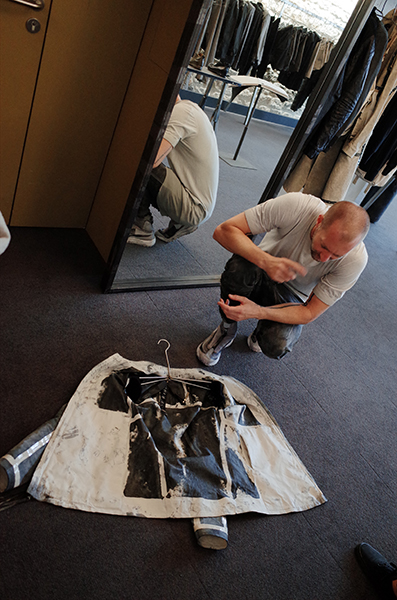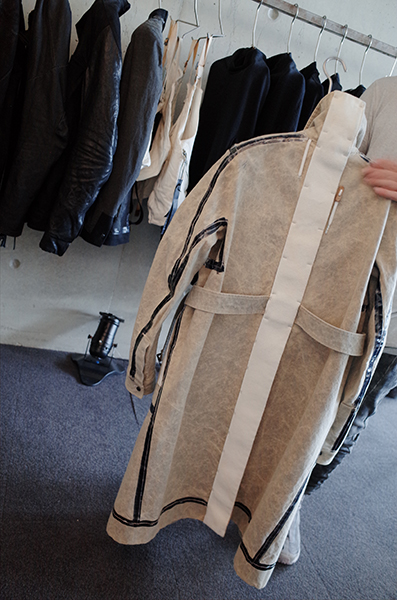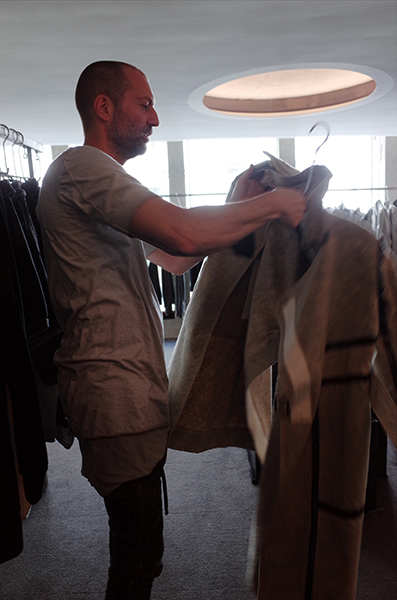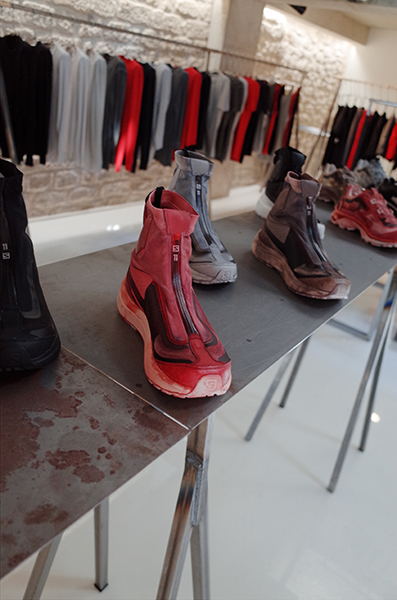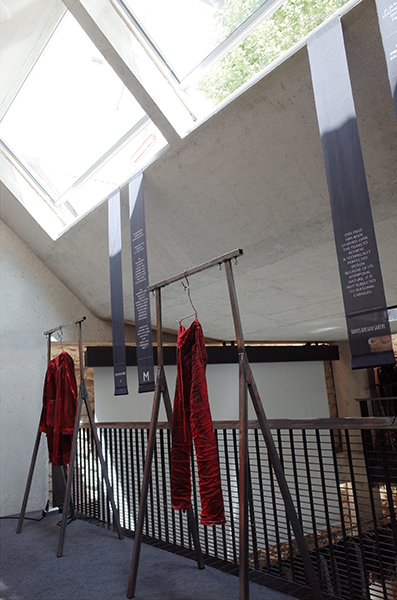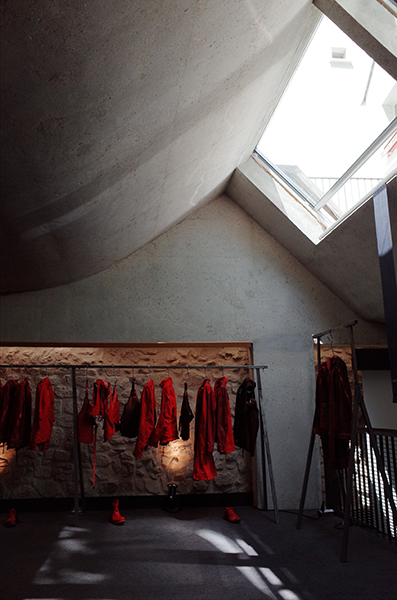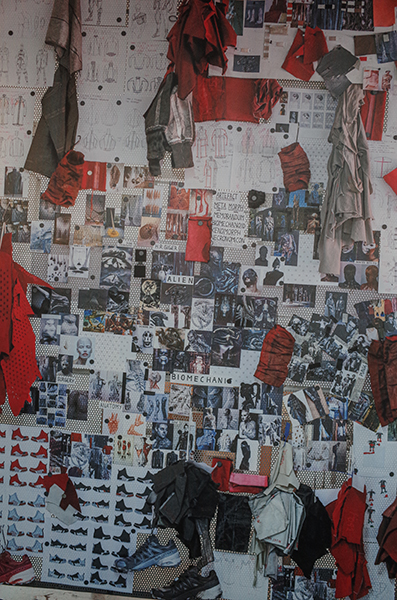Vol.135_Boris Bidjan Saberi
Boris Bidjan Saberi
Interviewed by Kim Kieun
From Paris, France
It is recent that you changed the way of presenting your work – you used to prepare for the runway having in mind the following fashion week schedule, but all these suddenly changed. What determined the change?
I consider that my real work is trying to reach perfection in my profession. The society positions me in the midpoint between fashion and art, and I try to take the best out of me. Pattern making, fabric research, experimenting from scratch... these trajectories take a certain time, similar to slow cooking. If you cook slow with good material, it takes time, and there is no other way to do it. If you have a huge team, it’s easier, but I don’t have it; and I also lack the financial background. Therefore, I had to comply to a certain philosophy – in these conditions, I can’t show the results every 6 months. It’s a matter of personal currency and of the potentiality of my knowledge. I can assume that if I show next season of summer, the quality can be affected, which I can’t admit. It doesn’t mean I don’t want to continue and set apart from the runway. It’s more about what I can bring on the table, let’s say invent my own bicycle. Nowadays, the world is asking for more and more, and it makes me think: “Do we really need more?”. I question to myself: “Why don’t I stop?”. There are so many clothing companies and brands on this planet, and I should give new designers a chance to become visible. And if I disappear, it’s OK; I will just open a bar or I will find something to survive. But If I stop it now, what will happen to my creating from scratch and the culture that started to form around my creation? If someone comes and explains: “Nobody needs this”, and if it’s understandable, I will definitely stop what I am doing now. At the question: “Do we need this or not?”, my answer at the moment is: “Humanity doesn’t need more clothing, but humanity needs culture to survive and continue. If the culture dies, humanity will die”. That’s the point for doing my job like crazy and for inventing again and again. My fashion world can’t be combined with the current fashion industry. The fashion industry is not about inventing, it’s about marketing. Fashion is also theater. I’m fine with it, but my theater is a little bit different. A little bit serious or heavier. If the world needs me, I’m super happy to do it and will do my best, because I really love what I’m doing and believe that the world needs it.
Please explain us more about the new collection – what is the engine behind your concept this time, and where do you position yourself in regard to your previous work.
It is like eating one piece of good meat… It’s haute couture for me and I am doing this every 6 months. Sawing pants by hand entirely seems stupid, but it’s amazing and it feels good. If you try it, you feel completely different. Then we come to the point when we consider our feelings toward the human beings and the values we appreciate. I can’t do things differently, but I can’t make theater. Instead of that, I’d prefer to open a little bistro and bring you a nice piece of meat. The whole collection started with this mind set. It has a lot to do with my family background and how my family educated me. I started the collection with the question: “What the f*** is going on in this world?” It made me go back to my roots. BBS is a kid from a very alternative family that has 4 blood lines – my mom is Irish-German and my father is Russian-Iranian. I was born in Munich. I lived my whole teenage life in Germany, Bavaria, a post-Nazi area in Germany; it was not that easy having in mind my cultural background. I always felt a stranger there, pretty crazy foreigner. Anyhow, this makes one tuff and at the end of the day, I didn’t feel like a stranger anymore. It’s not about where I come from, it’s about the mindset. I was born with a little Punk attitude and one time a punk is always a punk – I mean the mindset, not only the musical preference. You start being against something during your teenage years and when growing up, you are still against it. But I am not against things anymore. As being a punk grown up, what can you provide and what can you do against the things that don’t work? I don’t blame fashion, I respect all the work and the mindset from everybody who is out there – you don’t have to have only one mindset, it’s wrong for the society. From the perspective of my punk being today, I want to provide the maximum of my profession, and spread maximum and positive energy to this planet. In this way, all generations can take this value and make something out of it. Giger was the big reference for my generation and served as a source of inspiration. Giger helped me a little bit to find a name for this collection and determine the mindset that works for me. Biomechanics is a mix of humanity and robotics. In reality, my profession informs the human inside and the garments outside. That’s the thing and that’s the fusion, in a way. I created this notion – “bio indumentum”. Indumentum refers to the history of the garment and bio refers to the human being. The latest collection started with this thinking. Creation is a childish freedom for me. Really going very far and beyond in every way – in terms of construction, research, volume, length. There is no edge or wall for me. We go always as far as we can and then break down and find that point for the garments where everything is balanced. I prefer to make a jacket that looks like a normal jacket and then you find out that technically it is a genius piece. It has no seams, but fits perfectly; the fabric is not really understandable and it makes you think: “Is it leather?”. It is like walking on the street and somebody touches my garments and wonders what type of fabric that is. I want to insist and make this part stronger than anytime and create the craziest volume on earth. And then there is the problem of the presentation. If it’s on a hanger, you wouldn’t see it. If you see it on the model, on the runway, you would say OK. If you start touching and understanding it technically, you would say: “Wow! What and how is this possible?” That is the feeling I want and provide.
.
.
.
You can check out more images and contents through our magazine!

